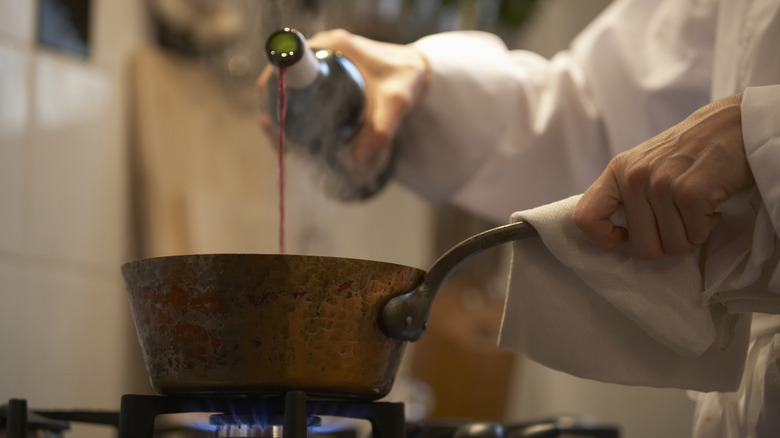How Long Does It Take For Wine To Become Vinegar (And Can You Use It)?
Oops, you popped open that bottle of wine with the intention of finishing it off, but fell asleep on the couch midway through the second glass again, didn't you? You can't even begin to remember how long ago that was, so you decide to give it the sniff test before you store an open bottle of wine in your fridge. Well, it doesn't take a sommelier to tell that the wine has undergone some, er, changes since your last sip. The fruity notes are now sharp and it smells... well, kind of like a science experiment left out on the counter for too long — acidic, with a touch of that unmistakable vinegar tang. But how long does it actually take for this transformation to happen? Well, the answer lies with microbes, oxygen, and time.
For wine, life begins with fermentation. This is the process where yeasts convert sugars into ethanol, which gives wine its boozy charm. However, if wine is exposed to air for prolonged periods, there isn't too much time before a new microbial cast steps in. Acetic acid bacteria, present in the air and on the surface of fermenting liquids, start to feed on ethanol and convert it into acetic acid — the compound responsible for vinegar's characteristic sharpness. This process can take anywhere from a few weeks to several months, depending on temperature, airflow, and exposure to light.
Your wine turned to vinegar — now what?
So, if the sniff test determines that your wine, did in fact, turn to vinegar, should you just toss it? Not necessarily. Once your wine has crossed the vinegar threshold, there's actually a lot that you can do with it. Yes, you could use it to degunk your appliances — just don't expect it to clean your entire kitchen — but you can also cook with it. Trust us, while you may not want to pour yourself a glass to drink, homemade vinegar in certain recipes can actually give the dishes a delicious flavor boost.
Add a few splashes of red wine vinegar to stews and sauces or use white wine vinegar for lighter dressings and marinades. Just be sure to taste and test your vinegary concoction before drenching your salad in it. Wine vinegar that has had time to mellow usually has a more subtle flavor, but if left to ferment too long, it can actually turn overly sharp. It's really all about trial and error and trusting your senses.
Whether you're tackling Chipotle's recipe for honey vinaigrette or making brine for pickling, a splash of homemade vinegar could be what's missing from your meals. So next time you have an unfinished bottle, don't immediately pour it down the sink — let nature do its thing and see what happens.

